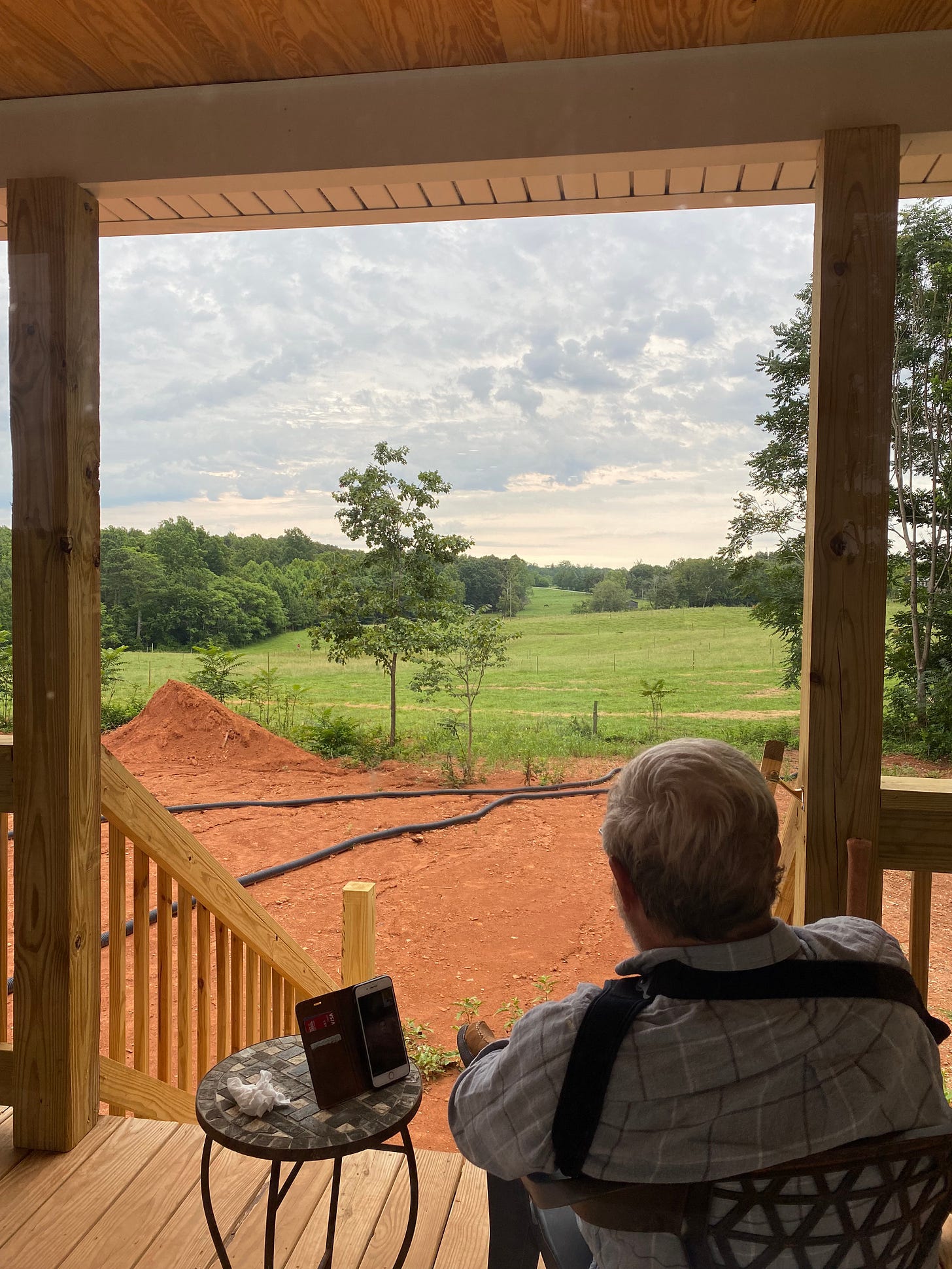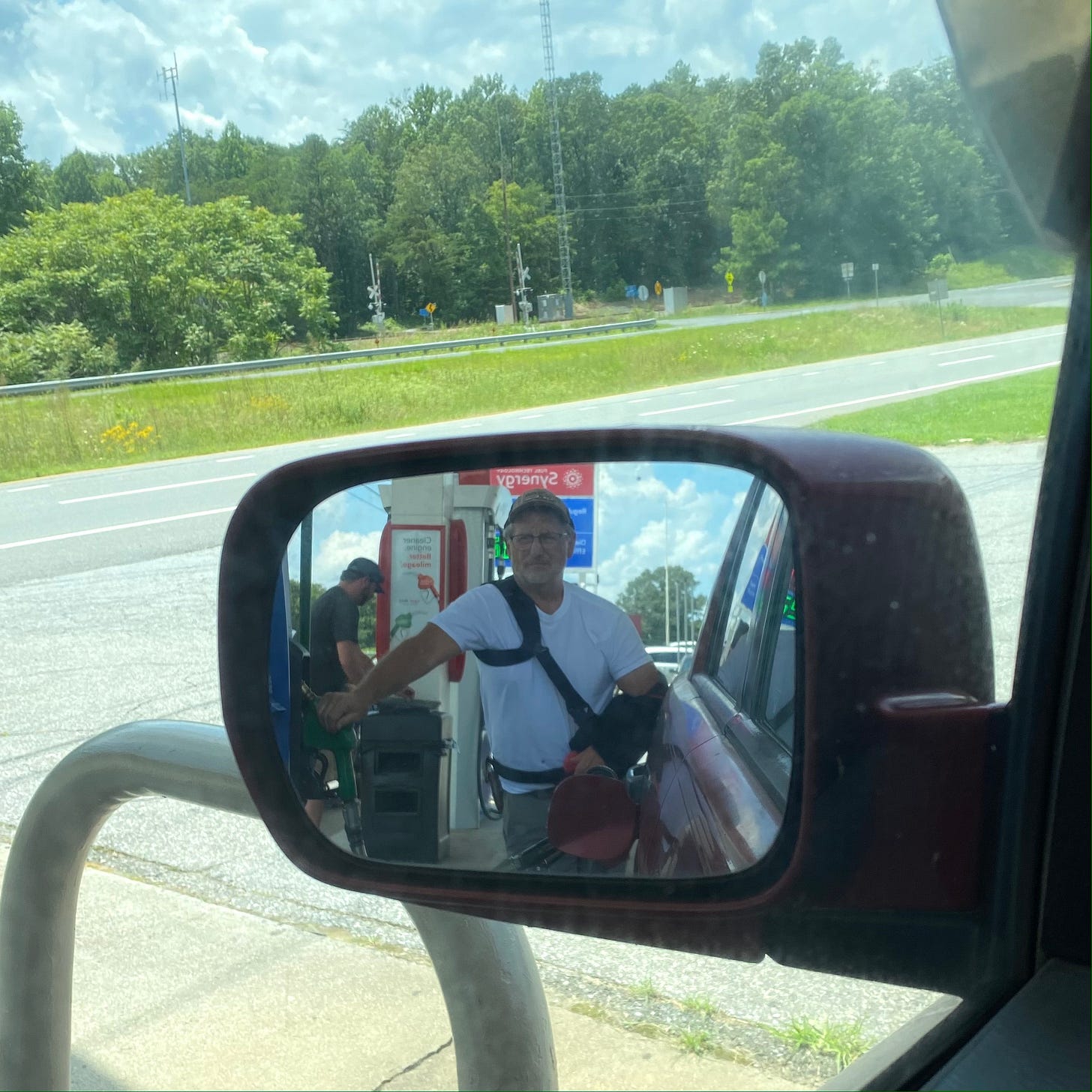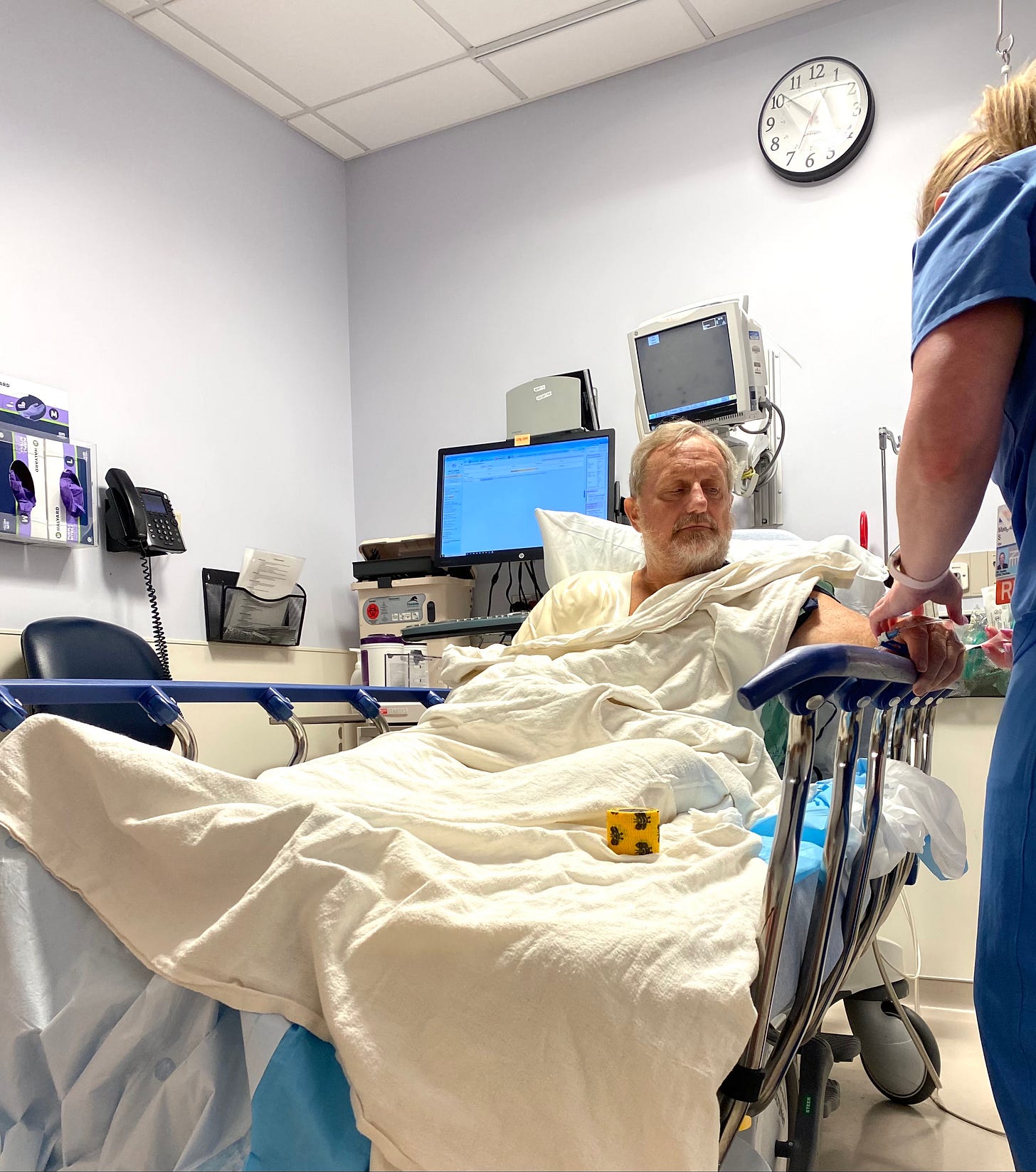Lessons from the sling
My husband had rotator-cuff surgery last Wednesday.
We’ve put this off for a lot of years. We finally got serious about it at the end of 2019 and had the MRI when we lived in Asheville, but then we weren’t able to schedule a surgery date. Something about a global pandemic and only life-saving surgeries being allowed.
Then we moved to Virginia and spent the first year trying to get the farm in order (the great lie of farming is that this can actually be accomplished), then started building a house, and one thing led to another and did you know that there is no actual good time to be without the use of half your body for six months?
So here we are, finally fixing the shoulder before it completely comes apart and turns into a shoulder replacement situation, which was the warning we got from the surgeon in March.
Surgery went well and we are now in the recovery phase, which is the longest and least fun part of all. Ben has “exercises” he does three times a day, which consist of taking the sling off and moving his hand and wrist around, then bending over and letting his arm hang straight down. While he’s in that position, he has to move his upper body so that his arm swings gently like a pendulum, forward and back, side to side, and in small circles, all without actually using his shoulder muscles. It’s harder than it sounds and I promised I wouldn’t post a video of what is screaming for a hula-hoop.
On Friday we were allowed to take off the thick foam tape that covered the upper-right quadrant of his body, and should you ever be faced with rotator-cuff repair, we have this advice: shave that part of your body first. Pulling the tape off was not a picnic, and we’ll leave it at that. With all the other advice we received, why didn’t someone warn us about this?
He was also allowed to shower, which is hard to do when you have to hold one arm at a 90-degree angle and slightly away from your body with the other hand, but Ben is now a fan of having someone else wash his hair. He kept telling me it was really dirty and please keep scrubbing the shampoo into his scalp. I told him this is 80% of the reason women go have their hair done—to get someone else to massage their head. I’m pretty sure he is on board now and I can go as often as I like.
We’ve been told the full recovery time is six months. That’s a long time. The sling stays on except for exercises and PT for six weeks. That is also a long time when you are living life wrong-handed. We’ve heard that you can maybe lift an empty coffee cup after two months and this is a whole new world for Ben, our resident coffee lover. And I won’t call him a work-a-holic publicly, but the man’s identity revolves around his ability to work. In the weeks leading up to surgery, the thing he was most anxious about was having to sit and not do physical labor.
We’ve had a friend (thanks, JK!) taking care of the farm since surgery day, and Ben has been sitting on the porch in the mornings watching her put up a new paddock and take an old one down, move the water tank, and then let the cows into the new paddock. (This is all taking place behind the tree in the photo.) If you know my husband, you know he is a doer, not a watcher. The lack of activity was killing him.
By Sunday afternoon, he was having serious work withdrawals and couldn’t stand it anymore. First we went to the gas station to put gas in his car. My husband has never let me pump gas when we’re together, and that day was no exception despite the fact that it took a solid five minutes for him to get untangled (without my help) from the seat belt and get the passenger door open with his left hand. He’s like a toddler insisting, “I can do it!”
Then we came back to the farm and went out in the pasture—in the hottest part of the day praise the Lord for clouds. We took down some old stakes and wound up the reels, carried them to the next section, and built the next few days’ paddocks. Then we weeded and watered the garden beds. Ben was able to get good and sweaty and felt like he did some actual work, and it was just the mental boost he needed. Then this morning we both went out and did the daily moving of the water and herd and he got to stand there communing with his cows, and that made him feel great. He just can’t tolerate inaction.
He also goes for a two-mile walk to the end of the road and back every morning, which started three days after surgery. On the fourth day I made orange chicken and fried rice for dinner, and he insisted on eating with chopsticks like he always does—but left-handed. I asked him who he was trying to prove his manliness to, and he replied, “Me.”
Maybe it’s because I am older and more aware of why we do the things we do, but I am noticing some things as we walk this recovery road. Here are just a few.
1. Everybody handles pain (and drugs) differently. I curl up and draw inward, not wanting to bother anyone with my discomfort. Ben turns into a warrior, trying to show everyone (or himself) how tough he is. This is most evident in the hour or two right after surgery when he is still a little loopy.
After he was completely awake and had been monitored for a while, it was time to get ready to go home. His nurse pulled all the wires and tubes and brought the bag with Ben’s clothes in it and left the room for me to help him get dressed.
Ben threw the covers back, swung his legs over the side of the gurney, and jumped to his feet. As I was reaching out to grab his good arm, he swayed a little and plopped back on the bed, saying, “Whoa, little dizzy.”
Ya think? Slow down, cowboy.
Once he was dressed and we’d been given all of our at-home instructions, Ben decided he wanted to use the restroom before we left. The nurse said, “Okay, it’s just out here and to the right. Take your time.” and she left the room. Did he walk carefully or slowly? Did he, in fact, take his time? No. He marched around the corner like a soldier on a mission.
When he came out, the nurse was waiting with a wheelchair to take him to the car. He looked at it and his high spirits immediately deflated. He mumbled with disgust, “I have to do this?” and the nurse cheerfully answered, “Yes, sir, you do!”
I’m not sure how the subject of coffee came up, but one nurse offered to make him a cup for the road since he hadn’t had any that morning, and Ben jumped at the opportunity. So we stood/sat in the hall while she went into the break room to pop a pod in the Keurig. She handed him the cup with a lid on it and said, “Be careful, it’s lava hot!” And as he quickly raised it to his mouth, she repeated more urgently, “Lava hot!” while Ben was gulping down half the cup. I waved my hand and said, “Don’t worry about it. He’s showing everyone how tough he is.”
After going through four surgeries with this man, I’ve learned to recognize his coming-off-the-anesthesia behavior. Years ago right after he’d had a biceps tendon repaired, he was reading a Ronald Reagan biography to the whole recovery room and declaring loudly, “I have to pee.” I finally had enough and got nose-to-nose with him and said quietly, “Alfred, you are acting like your father.” I never actually saw his father acting like this, but I knew it would get his attention and it bought me enough time to get him out of there and in the car.
But back to the pain. In the months leading up to this rotator-cuff repair, we heard variations of the same horror story: the pain is brutal. I always compare everything to natural childbirth, which I have experienced five times, and I’ve heard it said there is no worse pain than that. But I think that’s a different scenario because at least you know you’re getting a baby out of it, which makes the agony worthwhile. Not so with shoulder surgery, where all you get is more range of motion—not nearly as attractive as a newborn.
Anyway, we were warned by multiple people and several nurses to expect significant pain and don’t be alarmed about it. Just take the drugs, use the cold pack, and rest.
Right.
Ben took the oxycodone for exactly one day and decided that was enough. He is not a fan of being either high or asleep. He kept waiting for the “feeling of euphoria” that gets people hooked on this stuff, but apparently he slept right through it. He was not impressed, and since he has always thought sleep was an inconvenience, he decided pretty quickly the big drugs are not for him.
Then he took one of the step-down pills: Toradol. This is a strong anti-inflammatory/pain killer, kind of like ibuprofen-plus. He spent that day trying to make his eyes work together and stop spinning around like a cartoon character who got hit in the head with an anvil. Also there was the cotton-mouth. So Tylenol it is.
2. Mets baseball does not get any better no matter how many days in a row you listen to it. Even the announcers are struggling this year. Last night there was a blessed reprieve—a rain delay—wherein hope could lie in wait, at least for a little while. Where is the end of September when you need some relief? Our older son called to check on Ben and remarked, “Man, he can’t even watch the Mets. They’re horrible.”
3. Neural pathways are strong. When you’ve been right-handed all your life, you set things up to work a certain way without even thinking about it. It’s like an instinct. This is your brain trying to walk down the same well-worn paths that started forming in infancy when it decided you were going to be right-hand dominant, only now, there is crime-scene tape all over those pathways. Now you have to find a whole new way to get where you’ve been going all your life.
For instance, when the block of cheese is crooked on one end and you want to cut it off to even things up because maybe there’s also a little bit of OCD hiding in your personality, you set the block of cheese on the cutting board with the crooked end on the right. Then when you suddenly only have use of your left hand, your brain doesn’t know what to do with the crooked end. Which way does it go? Right or left? It’s like a lab rat in a new maze: What do I do? How does this even work? I watched Ben set a block of cheese on the board, look at it, turn it around, look at it again, then turn it around again, like he’d never sliced cheese in his life. This sounds like such a simple thing, but the confusion that goes on in your brain is fascinating. Don’t believe me? Tomorrow at work, try using your mouse with your non-dominant hand.
There are so many more things I wish I could tell you about, but mostly they would not be appropriate for this venue. You’ll have to experience your own shoulder surgery and recovery to enjoy them all.






I was just telling Adam the day Ben had his surgery that I knew it would be hard because Ben likes to be able to work and that was going to be very difficult. Makes me remember this past fall after I got hit by the drunk driver and couldn’t use my left hand/arm for 4 months… but I’m right handed. Goodness. Hope he has a great recovery and he’s blessed too have you to help (or not help;) him.
Nurse Karen for the win! Of the stories we could tell.